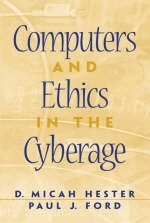
Computers and Ethics in the Cyberage
Pearson (Verlag)
978-0-13-082978-8 (ISBN)
- Titel ist leider vergriffen;
keine Neuauflage - Artikel merken
For Introduction to Ethics and Computer Ethics courses.
Designed to fill the need for a diverse classroom-based approach to computer ethics, this anthology of essays presents thought-provoking perspectives on the proliferation of computers in our lives. Topics range from privacy, copyright, and computer crime issues to the global impact of computers, online communities, and virtual reality. Essays are contributed and compiled by experts in a variety of disciplines. The breadth of scope allows students to begin to understand and evaluate the social and ethical issues raised by computer technologies.
(NOTE: Each section begins with an Introduction and concludes with a Selected Bibliography.)I. TECHNOLOGY, COMPUTERS, AND VALUES.
1. From Ethics of Technology to Ethics of Computers.
Assimilation of the Machine: New Cultural Values, Lewis Mumford. Views of Technology, Ian Barbour. Selections on Technology, Melvin Kranzberg, ed. Unique Ethical Problems in Information Technology, Walter Maner.
2. Computer Technologies as Value-Laden.
Creating the People's Computer, Michael Dertouzos. Computers and Reason, Theodore Roszak. Logic and Intuition, Michael Heim. Fairy Tales, Allen Newell.
II. COMPUTERS AND THE QUALITY OF LIFE.
3. Community and Intermediacy.
Social Strategies for Software, Jon Dorbolo. The Virtual Community, Howard Rheingold. Is There a There in Cyberspace?, John Perry Barlow.
4. Alienation, Anonymity, and Embodiment.
In the Age of the Smart Machine, Shoshana Zuboff. Implantable Brain Chips? Time for Debate, G.Q. Maguire, Jr., Ellen M. McGee. EPICAC, Kurt Vonnegut, Jr. Computers and the Human Identity, Raymond Gozzi.
5. Computers in Developing Nations.
The State, Computers, and African Development: The Information Non-Revolution, Bruce Berman. The Social Implications of Information Technologies: A Latin American Perspective, Judith Sutz. Cool Runnings: The Contradictions of Cybereality in Jamaica, Joerge Dyrkton. The Ethical Dilemma Caused by the Transfer of Information Technology to Developing Countries, Yero Baldeh.
III. USES, ABUSES, AND SOCIAL CONSEQUENCES.
6. Computer Professionals and the Professional Use of Computers.
Does Professional Ethics Include Computer Professionals?: Two Models for Understanding, Michael P. Hodges. Professional Relationships, Deborah G. Johnson. Developing Ethical Practices to Minimize Computer Misuse, Shalini Kesar and Simon Rogerson.
7. Freedom, Privacy, and Control in an Information Age.
Electronic Power to the People: Who is Technology's Keeper on the Cyberspace Frontier?, Michael R. Ogden. Remarks at the Computers, Freedom, and Privacy Conference, Representative Edward J. Markey. Privacy, Respect for Persons, and Risk, Dag Elgesem.
8. Piracy and Ownership.
The Morality of Software Piracy: A Cross-Cultural Analysis, W.R. Swinyard, H. Rinnie, and A. Keng Kau. Should I Copy My Neighbor's Software?, Helen Nissenbaum. So You Want to Be a Pirate?, Pirate editorial.
9. Hacking and Viruses.
Hacking and Virus, Tom Forester and Perry Morrison. The Conscience of a Hacker, The Mentor. Are Computer Hacker Break-Ins Ethical?, Eugene Spafford. Interview with a Hacker, Richard Spinello. The Computer Virus As Metaphor, Raymond Gozzi.
IV. EVOLVING COMPUTER TECHNOLOGES.
10. Artificial Intelligence.
Baku: EPICAC XIV, Kurt Vonnegut, Jr. Some Aspects of Ethics and Research into the Silicon Brain, Dan Remenyi and Brian Williams. Misrepresenting Human Intelligence, Hubert Dreyfus. What We Are Thinking About When We Are Thinking About Computers: Thinking About Aliveness, Sherry Turkle.
11. Virtual Environments.
Effects of Participating in Virtual Environments, John Wilson. The Virtual Sky is Not the Virtual Limit: Ethics in Virtual Reality, Blay Whitby. Being and Believing: Ethics of Virtual Reality, The Lancet.
12. Networking and the Internet.
Remarks on the Internet and Information Technologies, Albert Gore, Jr.. Losing Our Souls in Cyberspace, Mark A. Kellner and Douglas Groothuis. A Rape in Cyberspace, Julian Dibbell. On Space, Sex, and Being Stalked, Pamela Gilbert.
APPENDICES.
Appendix A: ACM/IEEE Software Engineering Code of Ethics and Professional Practice.
Appendix B: Codes of Ethics of Selected Foreign Professional Societies.
Appendix C: Selected “Appropriate Use” Regulations.
Appendix D: Further Resources in Computer Ethics.
| Erscheint lt. Verlag | 18.7.2000 |
|---|---|
| Sprache | englisch |
| Maße | 229 x 152 mm |
| Gewicht | 708 g |
| Themenwelt | Geisteswissenschaften ► Philosophie ► Ethik |
| Mathematik / Informatik ► Informatik ► Theorie / Studium | |
| Recht / Steuern ► Privatrecht / Bürgerliches Recht ► IT-Recht | |
| ISBN-10 | 0-13-082978-1 / 0130829781 |
| ISBN-13 | 978-0-13-082978-8 / 9780130829788 |
| Zustand | Neuware |
| Informationen gemäß Produktsicherheitsverordnung (GPSR) | |
| Haben Sie eine Frage zum Produkt? |
aus dem Bereich


